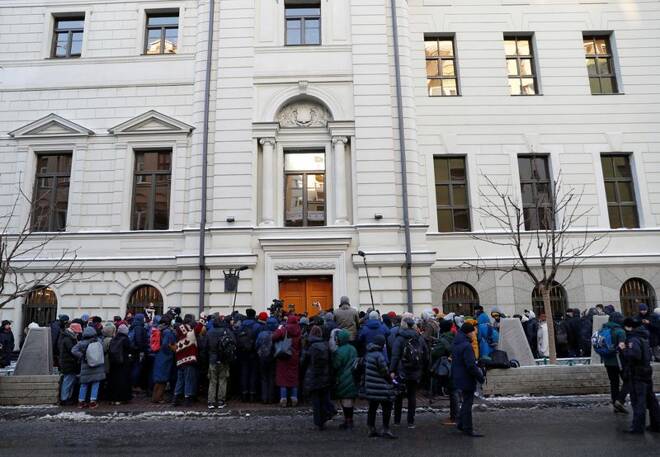Advertisement
Advertisement
Factbox-Memorial: Moscow shuts down chronicler of Soviet-era crimes
By:
MOSCOW (Reuters) - Russia's Supreme Court ordered the country's best-known human rights group on Tuesday to be liquidated for breaking a law requiring groups to register as foreign agents, capping a year of crackdowns on Kremlin critics unseen since the Soviet days.
MOSCOW (Reuters) – Russia’s Supreme Court ordered the country’s best-known human rights group on Tuesday to be liquidated for breaking a law requiring groups to register as foreign agents, capping a year of crackdowns on Kremlin critics unseen since the Soviet days.
Here are some facts about the group Memorial:
History
Memorial traces its roots to the 1980s under Mikhail Gorbachev, the last Soviet leader, who encouraged society to embrace greater openness, or “glasnost”. The movement’s founders included Nobel Peace Prize-winning dissident physicist Andrei Sakharov, who died in 1989, and his activist widow Elena Bonner.
International Memorial in its current form was set up in 1992, a year after the collapse of the Soviet Union, with the aim of documenting political repression and helping rehabilitate those who had been repressed under communism. It operates in Russia and other former Soviet states.
Since the 1990s, a Memorial rights centre registered as a separate organisation has notably played a major role in documenting violations in Russia’s southern Chechnya region, where Moscow defeated separatists after two major wars.
Activities
International Memorial unearths and publishes information on past crimes and mass human rights violations, and helps people access secret police files pertaining to their family history.
In particular, it has helped people piece together the history of their families during Josef Stalin’s 1937-38 Great Terror, in which nearly 700,000 people were executed, according to conservative official estimates.
Memorial compiles lists of victims and collects private testimonies, documents from family archives, objects and works of art related to the Gulag network of Soviet prison camps. Its archives, museum and library are thought to be the largest public repositories of such materials in Russia.
While the Soviet state disavowed Stalin and the repression of his era after his death in 1953, many Russians still revere him for his role as leader of the country during its World War Two victory. Memorial and its defenders accuse the authorities of seeking broadly to minimise and cover up Soviet-era crimes.
Pressure on memorial
2009 – Activist Natalya Estemirova, who worked with Memorial’s human rights centre in Chechnya, was kidnapped and murdered. The killers have not yet been found.
2014 – The Ministry of Justice designated its human rights centre, registered as a separate legal entity, as a foreign agent, a classification which carries negative Soviet-era connotations and brings with it burdensome bureaucracy.
2016 – Memorial itself was placed on the list of foreign agents.
2016 – The head of Memorial in the northern Karelia region, historian Yuri Dmitriev, was detained on child pornography charges in a case his supporters said was trumped up to punish him for unearthing a Stalin-era mass grave.
Dmitriev was found guilty in July last year of sexually abusing his adopted daughter, a charge he denies. This week, a Russian court added two more years to his 13-year jail sentence.
2018 – Oyub Titiev, head of Memorial’s human rights centre in Chechnya, was detained and accused of possessing illegal drugs. Titiev said the police had planted the drugs on him during a shake-down. He was sentenced to 4 years in a penal colony.
2018 – Memorial’s human rights centre office in Nazran, main town in the Ingushetia region adjacent to Chechnya, was set on fire.
2019 – The authorities levelled dozens of charges against the Memorial human rights centre and International Memorial for allegedly violating the law on foreign agents.
2021 – The Russian Prosecutor General’s Office filed a lawsuit to close down International Memorial, accusing it of systematic violations of the law on foreign agents.
A representative of the Prosecutor General’s Office, Alexei Zhafyarov, told Tuesday’s court hearing that the organisation posed a public threat and “speculates on the topic of political repression, distorts historical memory… and creates a false image of the USSR as a terrorist state”.
(Reporting by Anton Zverev and Polina Nikolskaya; Editing by Andrew Osborn and Peter Graff)
About the Author
Reuterscontributor
Reuters, the news and media division of Thomson Reuters, is the world’s largest international multimedia news provider reaching more than one billion people every day. Reuters provides trusted business, financial, national, and international news to professionals via Thomson Reuters desktops, the world's media organizations, and directly to consumers at Reuters.com and via Reuters TV. Learn more about Thomson Reuters products:
Did you find this article useful?
Latest news and analysis
Advertisement
